#merlin stills
Text
just remembered a fic on AO3 (or more likely LJ because it had that distinct late 00's experimental vibe) that appeared double-spaced oddly, in that some paragraphs would be spaced normally and others would have double or even triple spaces in between. it was about one half of the otp getting over the other's death (or coma, can't remember which), so all the comments were about how poignant the use of visual spacing was as a means to convey all the emotional holes in the character's life.
and then the author replied like... *giggle* guys it's NOT double spaced. try selecting the whole text
and we were all like "no WAY"
but we selected the text, and yes!!!
the "holes" in the story? they were actually lines and actions from the dead/coma character's ghost, rendered invisible to the eye by the simple trick of coloring the text the exact same as the background, revealed by nothing more than a click and a drag of the mouse
a story about the profound loneliness of losing your the partner of your life and having to make do without them, without anything to fill the holes they'd left behind, suddenly became a story about the profound helplessness of seeing someone you love suffer from your absence while you are right there, unable to do anything about it, unable to communicate that you love them enough to suffer unseen and unheard with them, just to keep them company they'll never know about
it was then that I truly realized how *superior* the digital medium is to plain printed paper, how the medium and the format can add to a story.
I think about that fic about once a year. I wish I could find it again
EDIT: FOUND IT!!!! UPDATE HERE
#probable fandoms for it (that I was in at that time): naruto Hikaru no go deathnote maybe?#definitely not Harry Potter or BBC merlin. I can't recall what else I was into back in 2008-2009#God I miss those Fandom days. everyone was doing such NEAT things both coding and writing wise#fanfic#pretty sure it was LJ#UPDATE: IT WAS LJ AND THE FIC IS BBC SHERLOCK 🤮#but still worth reading
45K notes
·
View notes
Text

"One day..."
(for the BBC Merlin Excalibur Zine)
#bbc merlin#merlin#merthur#arthur pendragon#fanart#bbc merthur#holding on hope#i still need to finish my rewatch#merthur if you squint but also if youve seen the series it is like that all the time
2K notes
·
View notes
Text
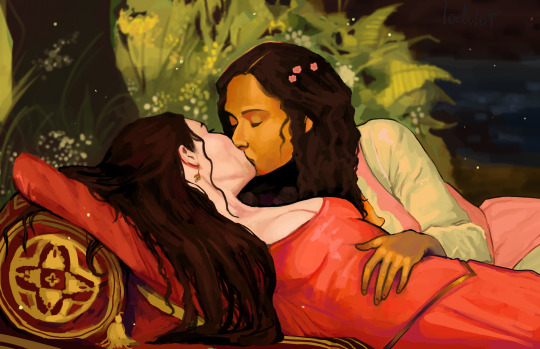
morgwen study
#morgana x gwen#merlin bbc#Merlin#morgwen felt like lovers to enemies and merthur was the opposite#probably a popular take#digital art#artists on tumblr#fanart#merlin fanart#Morgana#guinevere#morgwen art#morgwen#merlin art#morgana pendragon#morgana le fay#queen guinevere#guinevere pendragon#lesbians#wlw art#wlw#sapphic#procreate#merlin 2008#I’m so sleepy it’s defeating me um#still haven’t finished this show goddamn#art#art study#goodnight
2K notes
·
View notes
Text

THIS WAS NOT ON MY 2023 BINGO CARD.
#ARE WE GETTING A REBOOT#HELP#ik im a bit late to the party here but im still in shock#bbc merlin#merthur#merlin
4K notes
·
View notes
Text
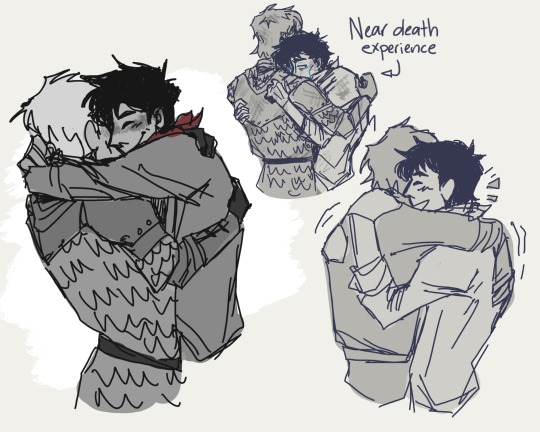
If canon won't let them hug, I will make them hug
#merthur#bbc merlin#merlin#arthur pendragon#merlin fanart#my art#digital art#emrys#once and future king#this show is forcing me to learn how to draw hugs#why is Merlin crying? Arthur nearly died ofc! and he still can't tell him about his magic :( sadness :(
4K notes
·
View notes
Text
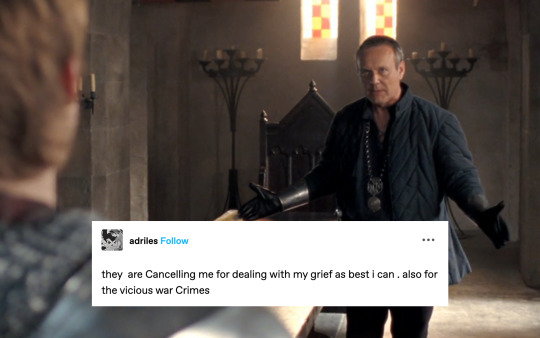
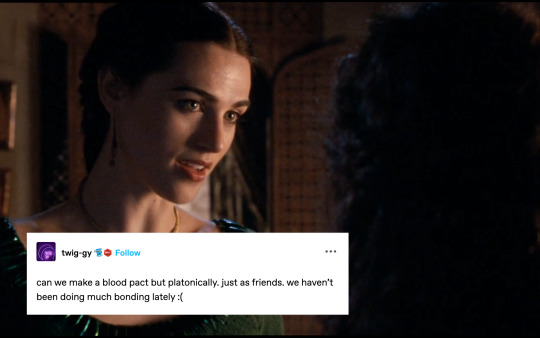

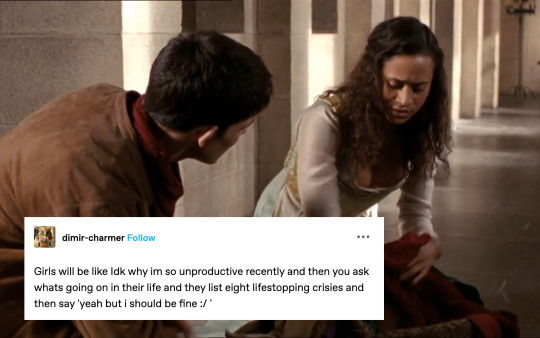
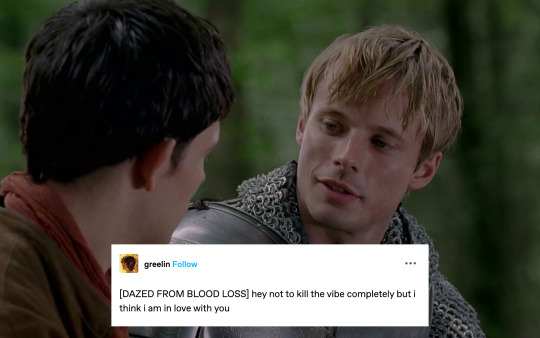
BBC Merlin & Text Posts (16/?)
#this might be the last one until I find a new platform to stream merlin for screenshots#still salty at stan australia for that#bbc merlin#merlin#morgwen#merthur#uther pendragon#morgana pendragon#hunith#gwen#merlin memes#merlin text posts
1K notes
·
View notes
Text
not right now babe, I’m reading fix it fics for a fandom that ended a decade ago which has transformed me as a person and still can’t let go of
#alex says things#hannibal#I watched it in 2013 and still be reading post fall fics#MERLIN#THEYRE HAPPY ACTUALLY BYE#ao3#fanfiction#mine:text post
4K notes
·
View notes
Text
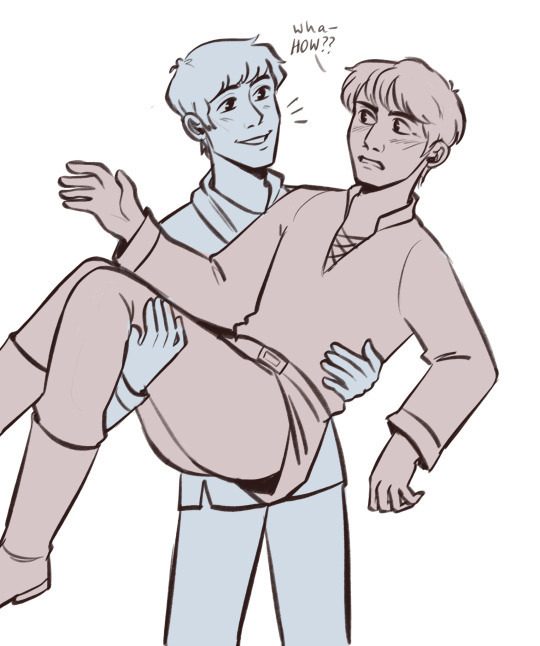
Merlin is trending for no reason again!! so here’s a silly little doodle I had of merlin picking Arthur up because he canonically can in s5
#merlin#merthur#bbc merlin#merthur fanart#Merlin fanart#doodle#this was never supposed to see the light of day#because I’m still struggling to figure out how I draw them#but merlin trending calls for dumpster diving into my wips to find something#arthur pendragon#merlin emrys
850 notes
·
View notes
Text
we as a collective do Not talk about this line delivery nearly enough and for good fucking reason, i'll kill bradley james for this one line alone. he's just a little boy :'((
#sami rambles#like. he's still the same little kid who didn't really know what it was to be looked after/cared for/doted on#at the heart of him he's still just that lonely young boy who always had to earn people's attention#or just take whatever he got for the simple fact of being the king's son :/#even after so long he's still not used to merlin's love. and now. now he can't see what he's ever done to deserve it#seeing everything all at once and he just. he needs answers before he goes.#he's just a little boy asking 'why' to prolong his bedtime a few moments more#oh fuck. just caused irreparable damage to myself with that last one ahaha#merlin#bbc merlin#arthur pendragon#merthur#bradley james
1K notes
·
View notes
Text
If Merlin does actually come back I just know Tumblr will become a radioactive war zone. Every man (gn) for themselves
#rightfully so#merlin#anyways the merlin fandom has produced some of the best fanfiction out there#loaded march is still the best series I've ever read
3K notes
·
View notes
Text
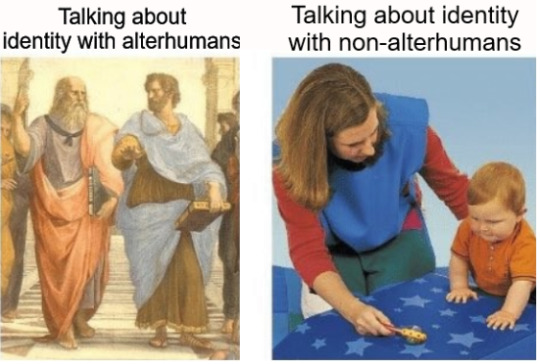
Has this been done yet? Probably.
Tried to use language that's inclusive of alterhumans who are still human.
#please assume that this includes you even if you use alterbeing instead#or dont use the alterhuman label but are still something that could fall under it#you get the point#alterhuman#otherkin#plural#plural system#otherhearted#copinglink#otherlink#fictionkind#therian#fictionkin#fictionflicker#tulpa#soulbond#op#merlin (xe/he/they)#everything althu#everything plural#althu memes#everything flicker#everything hearted#everything otherkin#everything link#plural memes#otherkin memes#link memes#hearted memes#flicker memes
1K notes
·
View notes
Text
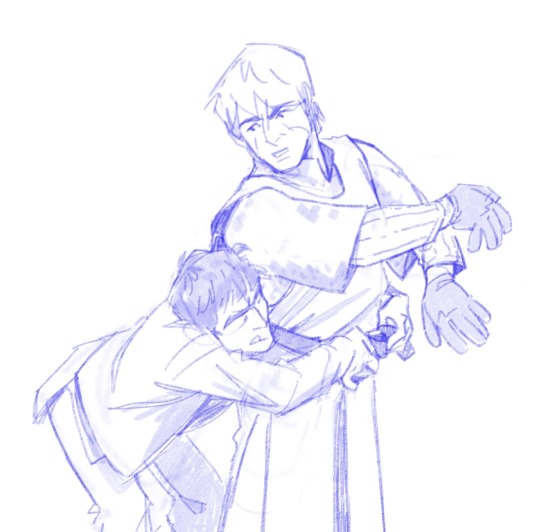
why’d he do arthurs belt like that 🤨 unnecessary
#like in ep 2. merlin what was that#old sketch from a few momths ago but its still so funny to me. why did he do that#merlin#bbc merlin#arthur pendragon#merlin bbc#merlin art#merlin fanart#arthur pendragon fanart#bbc merlin fanart#bbc merlin art#gayass way to put on a man’s belt merlin 🤨
2K notes
·
View notes
Text

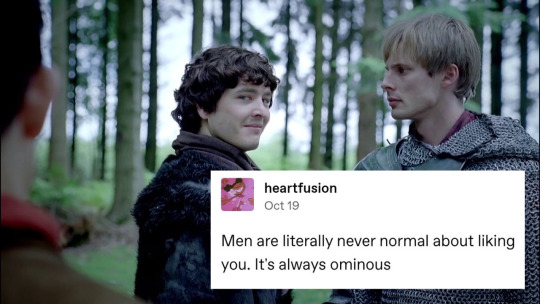
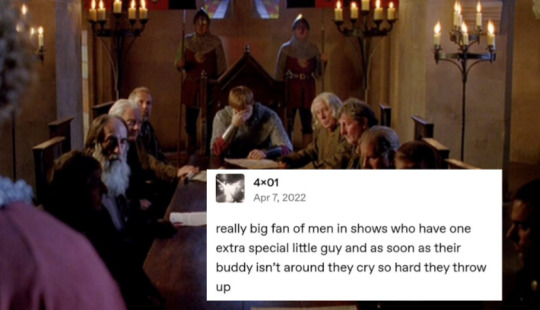

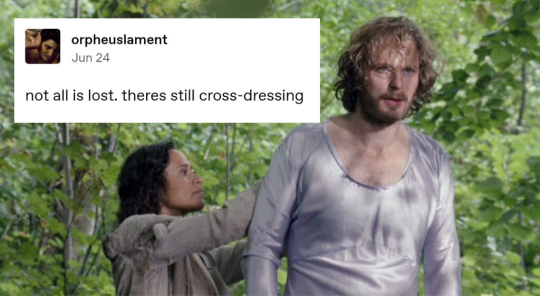


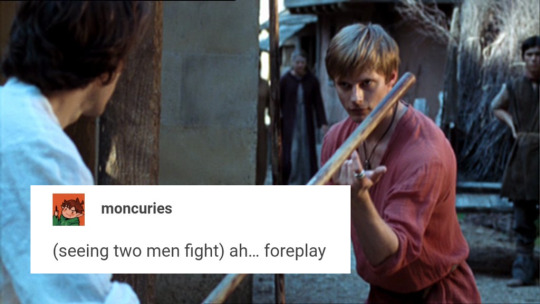

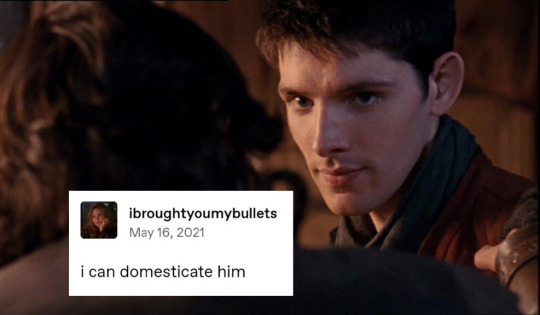

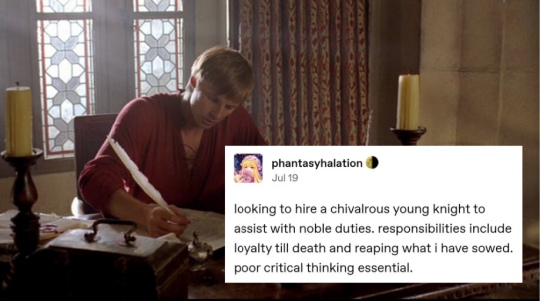
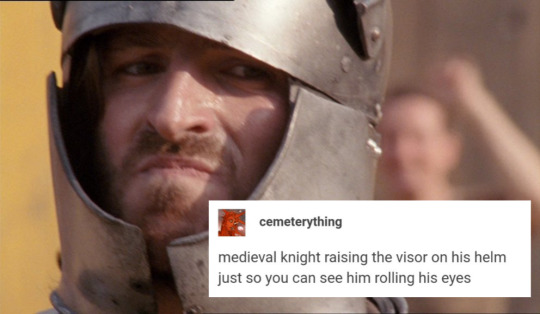
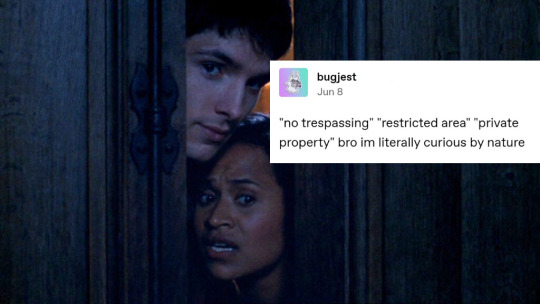
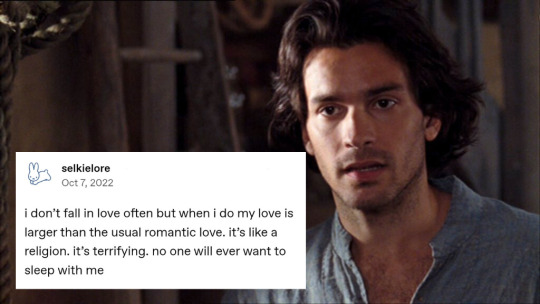




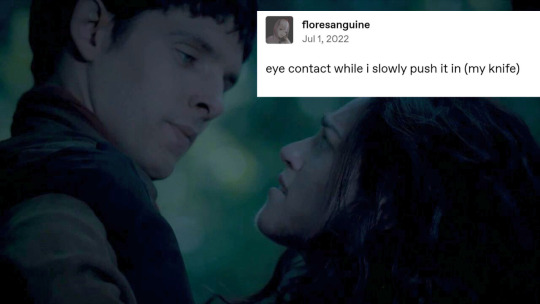
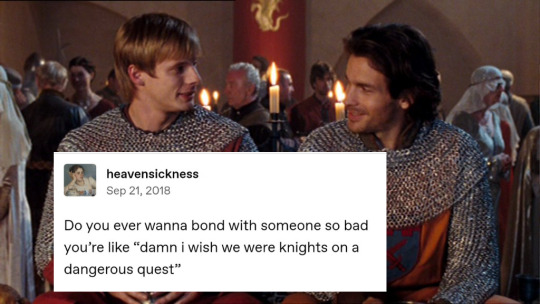
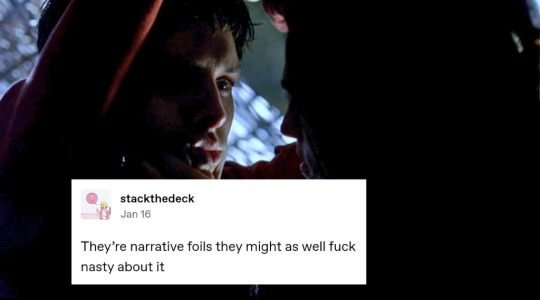
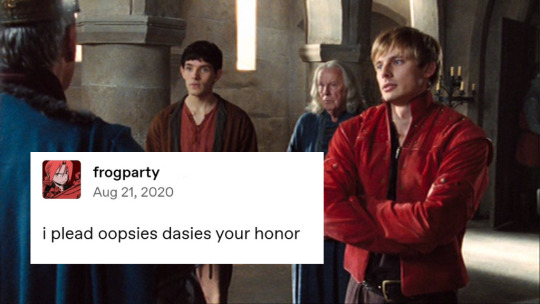
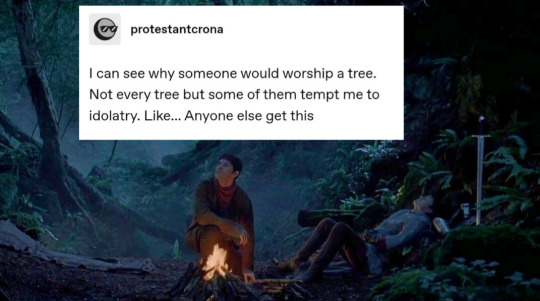
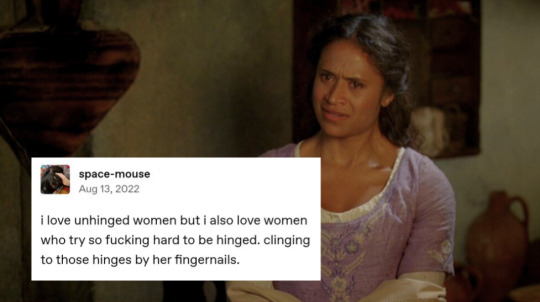
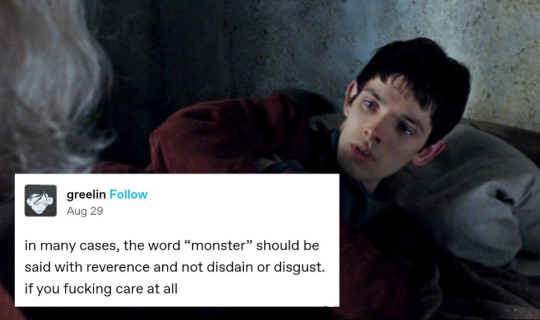

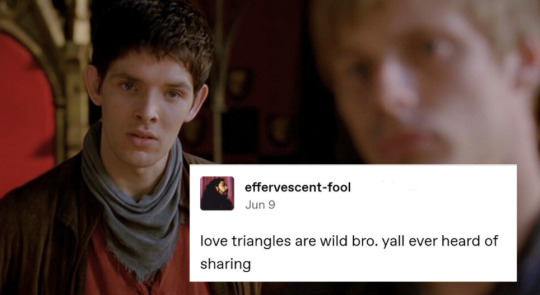
#he can be trusted on a nature walk i promise#text post meme#merlin memes#merlin#bbc merlin#i know i say this every time but i still cant believe they showed us gwaine post-coitus. that was wild.#1k
1K notes
·
View notes
Text
While Merlin is trending I want to thank the whole Merlin fandom
people who have been with us since 2008 and people who have just started watching, people who have left us too soon but will be forever in our hearts and people who switched fandoms but are still amazing
whereter you create, lurk, cheer or just cry in the corner (most of us have been there lol) every part of the Merlin fandom is always part of our family
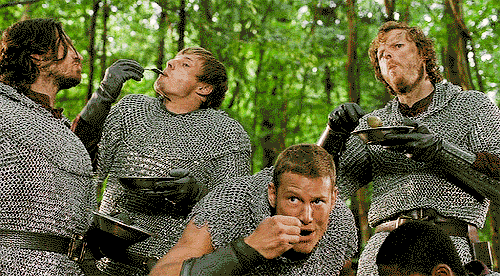
even if we have no reason to trend we will always have a reason to celebrate :D
#bbc merlin#merlin#merlin fandom#ok sembra una sviolinata#ma i sentimenti sono onesti#<33<<3<3#to tex who taught me to welcome people with my heart open#her warmth is still in my thoughts#to kitty who has shown me how good communities can be#to sunfall aeris ligi and so on who showed me the love you gives is given back to you tenfolds#to merlocked alby deheer feuxx mushroomtale stelle and all the other amazin artists#all of your art moved me and kept me creative!#to amazing fic writers#to elv for being amazing#to bunny brunettepet and eurydice loved getting your comments and seeing your names in my pages#<3<3<3<3#to malu I still have your postcard in my library remindign me to draw more perwaine XD#to archaeologist thanks for the amazing photos#<3<3<3#a big hug to you all!!!
2K notes
·
View notes
Text
having a merlin phase in 2024...who up rn
#lookin for moots to cry with xoxo#lmao trying to find people still having a merlin phase so i can stop screaming into the void about it#bbc merlin#merlin#merlin emrys#merthur
672 notes
·
View notes
Text
The fandom echo chamber: fanon, microanalysis and conspiracy brain
As someone who has been in fandom spaces, on and off, for 20 years, I find some fascinating trends popping up in the last decade that I thought to be fandom-specific but clearly aren’t. So, I would like to do a little examination of where those things come from, how they are engaged with, and what it says about the way we consume media. This is a think piece, of sorts, with my brain being the main source. As such, we will spend some time down the memory lane of a fandom-focused millennial.
This is largely brought about by Good Omens. But it’s also not really about Good Omens at all.
Part one. Fanon.
The way we see characters in any story is always skewed by our very selves. This is a neutral statement, and it does not have a value judgement. It’s simply unavoidable. We recognise aspects of them, love aspects of them, and choose aspects of them to highlight based entirely on our own vision of the universe.
Recognition comes into this. There is a reason so many protagonists of romance novels have a “blank slate” problem. Even when they do not, we love characters who are like us or versions of us that we would like to be. And when we say “we”, I also mean, “me”.
(I remember very clearly this realisation hit me after a whole season of Doctor Who with writing which I hated utterly when I questioned why I still clung so incredibly hard to Clara Oswald as my favourite companion. Then I looked at myself in the mirror. Oh. Well. That would do it, wouldn’t it?)
Then, there is projection, and, again, this is a neutral statement. Projection exists, and it is completely normal and, dare I say it, valid way of engaging with — well, anything. Is the character queer? Trans? Neurodivergent? Are they in love? Do they like chocolate? Are they a cat person? Well, yes, if this is what the text says, but if the text does not say anything… You tell me. Please, do tell me. Because, in that moment of projection, they are yours.
And then, there is fandom osmosis, and that is the most fascinating one of them all, the one that is not very easy to note while you are inside the echo chamber. It’s the way we collectively, consciously or not, make decisions on who or what the characters are, what their relationships are, and what happens to them.
(Back when I was writing egregiously long Guardian recaps on this blog I actually asked if Shen Wei’s power being learning actually was stated anywhere in the canon of the show. Because I had no idea. I have read and reread dozen of fanfics where that is the case, and at some point through enough repetition, it became reality.)
We are all kind of making our own reality here, aren’t we?
Back when things were happening in a much less centralised manner - in closed livejournal groups, and forums of all shapes and sizes - I don’t remember there being quite as much universally agreed upon fanon. Frankly, I don’t remember much of universally agreed upon anything. But now, everything is in one place: we have this, and we have AO3, and it’s wonderful, it really is so much easier to navigate, but it’s also one gigantic reality-shifting echo chamber, with blogs, reblogs, trends, and rituals.
Accessibility plays its part, too. If you were, say, in Life on Mars (UK) fandom between seasons, and you wanted to post your speculation fic, you had to have had an account, and then find and gain access to one of the bigger groups (lifein1973 was my poison, but ymmv), and then, if you feel brave you may post it, but also, you may want to do so from your alt account if you wanted to keep yours separate, and then you would have to go through the whole process again. And I’m not saying that fan creations then were somehow inherently better for it than fan creations now (although Life on Mars Hiatus Era is perhaps a bad example - because some of the Speculation Fic there was breathtaking), but there is something to say about the ease of access that made the fandoms go through a big bang of sorts.
(I mean, come on, I can just come here and post this - and I am certain people will read it, and this blog is a pandemic cope baby about Chinese television for goodness sake.)
The canon transformations that happen in the fandom echo chamber truly are fascinating to witness as someone who is more or less a fandom butterfly. I get into something, float around for a bit, then get into something else and move on. I might come back eventually when the need arises, but I don’t sustain a hiatus mind-state. This means that when I float away and return, I find some very intriguing stuff.
Let’s actually look at Good Omens here. Season two aired, and I found it spectacular in its cosy and anguished way; deliberately and intelligently fanfic-y in its plot building; simple but subversive, and so very tender. (I will have to circle back to this eventually, because, truly, I love how deliberately it takes the tropes and shatters them - it’s glorious). And, to me - a person who read the book, watched the first season, hung around AO3 for a few weeks and moved on - absolutely on-point in terms of characterisation.
So imagine my surprise when the fandom disagreed so vehemently that there are actual multi-tiered theories on how characters were not in possession of their senses. Nothing there, in my mind, ever contradicted any of the stated text, as it stood. This remained a strange little mystery until I did what I always do when I flutter close to an ongoing fandom.
I loaded AO3 and sorted the existing fic by popularity. And there it was, all there: the actual earth-shattering mutual devotion of the angel and the demon; willingness to Fall; openness and long heart-aching confession speeches. There was all of the fanon surrounding Aziraphale and Crowley, which, to me, read as out of character, and to one for whom they became the reality over the last four years, read as truth.
Again, only neutral statements here. This is not a bad thing, and neither this is a good thing, this is just something that happens, after a while, especially when there are years for the fandom-born ideas to bounce around and stew. I can’t help but think that so much of what we see as real in spaces such as this one is a chimaera of the actual source and all the collective fan additions which had time and space to grow, change, develop, and inspire, reverberating over and over again, until the echoes fill the entirety of the space.
Eventually, this chimaera becomes a reality.
Part two. Microanalysis
Here are my two suppositions on the matter:
1. Some writers really love breadcrumb storytelling.
Russel T Davies, for instance, on his run of Doctor Who (and, if you are reading it much later - I do mean the original one), loved that technique for his seasonal arcs. What is a Bad Wolf? Who is Harold Saxon? Well, you can watch very very carefully, make a theory, and see it proven right or wrong by the end of the season.
Naturally, mystery box writers are all about breadcrumb storytelling: your Losts and your Westworlds are all about giving you snippets to get your brain firing, almost challenging you to figure things out just ahead of the reveal.
2. We, as humans, love breadcrumbs.
And why wouldn’t we? Breadcrumbs are delicious. They are, however, a seasoning, or a coating. They are not the meal.
Too much metaphor?
Let’s unpack it and start from the beginning.
Pattern recognition colours every aspect of our lives, and it colours the way we view art to a great extent. I think we truly underestimate how much it’s influenced by our lived experiences.
If you are, broadly speaking, living somewhere in Western/North-Western Europe in the 14th century, and you see a painting in which there is a very very large figure surrounded by some smaller figures and holding really tiny figures, you may know absolutely nothing about who those figures are, but you know that the big figure is the Important One, and the small ones are Less Important Ones, and the tiny ones are In Their Care. You know where your reverence would lie, looking at this picture. And, I imagine, as someone living in the 14th century, you may be inspired to a sense of awe looking at this composition, because in the world you live in, this is how art works.
If you, on the other hand, watch a piece of recorded media and see the eyes of two characters meet as the violins swell, you know what you are being told at that moment. You don’t have to have a film degree to feel a sort of way when you see a green-tinged pallet used, when cross-cuts use juxtaposing images, or notice where your focus is pulled in any given shot. This stuff - this recognition of patterns - has been trained into us by the simple fact that we live in this time, on this planet, and we have been doing so long enough to have engaged recorded media for a period of time.
As humans, we notice things. Our brains flare up when they see something they recognise, and then we seek to find other similar details and form a bigger picture. This often happens unconsciously, but sometimes it does not. Sometimes we do it on purpose: finding breadcrumbs in stories is a little bit like solving a mystery. It allows us to stretch that brain muscle that puts two and two together. It makes us feel clever.
So yes, we love breadcrumbs, and, frankly, quite a lot of storytelling takes advantage of this. It’s very useful for foreshadowing, creating thematic coherence, or introducing narrative parallels and complexity. It’s useful for nudging the viewer into one or the other emotional direction, or to cue them into what will happen in the next moment, or what exactly is the one important detail they should pay attention to.
Because this is something media does intentionally, and something we pick up both consciously and not, it is very hard to know when to stop. We don't really ever know when all of the breadcrumbs have been collected. It becomes very easy to get carried away. There is a very specific kind of pleasure in digging into content frame by frame, soundbite by soundbite, chasing that pleasure of finding.
But it is almost never breadcrumbs all the way down. They are techniques to help us focus on the main event: the story. I truly believe those who make media want it to reach the widest possible audience, and that includes all of us who like to watch every single thing ever created with our Media Analysis Goggles on and those who are just here to enjoy the twists and turns of the story at the pace offered to them. And I think, sometimes in our chase to collect and understand every little clue we forget that media is not made to just cater for us.
One can call it missing a forest for the trees. But I would hate to mix my metaphors, so let’s call it missing a schnitzel for the breadcrumbs.
Part three. The Conspiracy Brain.
If you are there with me, in the midst of the excited frenzy, chasing after all those delicious breadcrumbs, then patterns can grow, merge together, and become all-encompassing theories. Let’s call them conspiracy theories, even though this is not what they truly are.
So, why do we believe in conspiracy theories?
One, Because We Have Been Lied To.
All conspiracies start with distrust.
If you are in fandom spaces - especially if you are in fandom spaces which revolve around a queer fictional couple - especially-especially if you have been in such spaces for a period of time, you have most certainly been lied to at one point or another.
We don’t even have to talk about Sherlock - and let’s not do that - but do you remember Merlin? Because I remember Merlin. Specifically, I remember the publicity surrounding the first season, with its weaponised usage of “bromance” and assertions that this whole thing is a love story of sorts, and then the daunting realisation that this was all a stunt, deliberately orchestrated to gather viewership.
And, because we were lied to in such a deliberate manner for such an extensive period of time, I genuinely believe that it forever altered our pattern recognition habits, because what was this if not encouragement to read into things? Now we are trained to read between the lines or see little cries for help where they might not be. Because we were told, over and over again, that we should.
(Yes, I think we are all existing in these spaces coloured by the trauma of queer-bating. I am, however, looking forward to a world where I can unlearn all of that.)
Two, Cognitive Dissonance.
The chain reaction works a bit like this: the world is wrong - it can’t possibly be wrong by coincidence - this must be on purpose - someone is responsible for it.
Being Lied To is a preamble, but cognitive dissonance is where it all originates. In so many cross-fandom theories I have noticed a four-step process:
A) this is not good
B) this author could not have made a mistake
C) this must be done on purpose
D) here is why
(Funny thing is, I have been on the receiving end of the small conspiracy spiral, and it is a very interesting experience. Not relevant to this conversation is the fact that a lot of my job revolves around storytelling. What is relevant is that my hobbies also revolve around storytelling. And one of them is DnD. Now, imagine my genuine shock when one of the players I am currently writing a campaign for noticed a small detail that did not make a logical sense within the complexity of the world, and latched on to it as something clearly indicating some kind of a secret subplot. Their thinking process also went a bit like this: this detail is not a good piece of writing — this DM knows how to tell stories well — this is obviously there on purpose. It was not there on purpose. I created a clumsy shorthand. I erred, in that pesky manner humans tend to. And, seeing this entire thought process recited to me directly in the moment, I felt somewhere between flattered and mortified.)
This whole line of thinking, I think, exists on a knife’s edge between veneration and brutal criticism, relentlessly dissecting everything “wrong”, with a reverent “but this is deliberate” attached to it like a vice, because it is preferable to a simple conclusion that the author let you down, in one way or another.
Three, Intentionality
I believe that there is no right or wrong way of engaging with stories, regardless of their medium, and assuming no one gets hurt in the process. While in a strictly academic way, there is a “correct” way of reading (and reading into) media, we here are largely not academics but consumers; consumption is subjective.
However, this all changes when intentionality is ascribed.
The one I find particularly fascinating is the intentionality of “making it bad on purpose” because, as open-minded as I intend to always be, this just does not happen.
It certainly does not happen in long-form media. Even in the bread-crumb mystery box-type long-form media.
When television programs underdeliver, they also underperform, and then they get cancelled.
If all the elements of Westworld Season 4 that did not sit together in a completely satisfactory way were written deliberately as some sort of deconstruction for the final season to explore, then it failed because that final season will now never come.
(There will likely never be a Secret Fourth Episode.)
And look, I am not here to refute your theories. Creativity is fun, and theorising is fantastic.
But, perhaps, when the line of thought ventures into the “bad on purpose” territory, it could be recognised for what it is: disappointment and optimism, attempting to coexist in a single space. And I relate to that, I do, and I am sorry that there is even a need for this line of thinking. It’s always so incredibly disappointing that a creator you believed to be devoid of flaws makes something that does not hit in the way you hoped it would. It’s pretty heartbreaking.
Unfortunately, people make mistakes. We are all fallible that way.
Four, Wildfire.
Then, when the crumbs are found, a theory is crafted, and intentionality is ascribed, all that needs to happen is for it to catch on. And hey, what better place for it than this massive hollow funnel that we exist in, where thoughts, ideas and interpretations reverberate so much they become inextricable from the source material in collective consciousness.
Conspiracy theories create alternate realities, very much like we all do here.
So where are we now?
I am not here to tell you what is right and what is wrong; what is true, and what is not. We are all entitled to engage with anything we wish, in whichever way we wish to do it. This is not it, at all.
All I am saying is… listen.
Do you hear that echo?
I do.
#fandom thoughts#fanon#good omens#good omens 2#bbc sherlock#merlin bbc#think piece#it's been years and I still have no idea how to tag#conspiracy theories#fandom content#all fandoms
2K notes
·
View notes